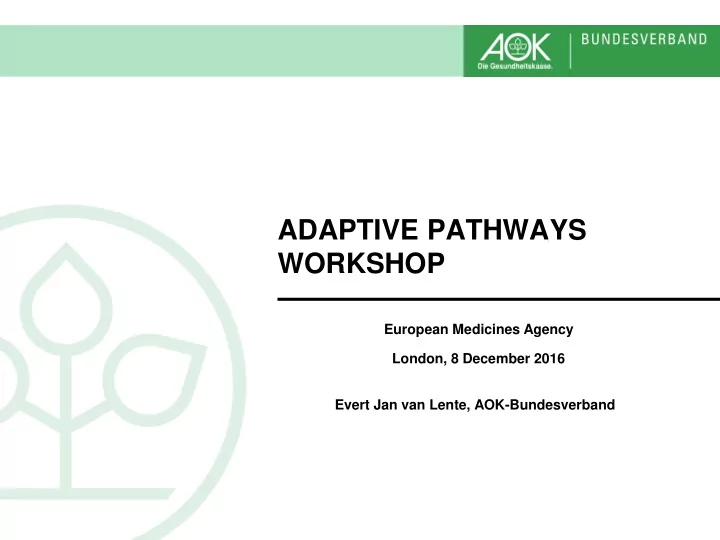

ADAPTIVE PATHWAYS WORKSHOP European Medicines Agency London, 8 December 2016 Evert Jan van Lente, AOK-Bundesverband
What kind of problems with fast-track approvals in Germany? Patients have access to all products with marketing authorisation; Germany relies on EMA regarding safety and efficacy New products undergo an HTA assessment by IQWiG to assess added benefit of the drug as basis for price negotiations and quality assurance measures (exceptions for orphan drugs) 10% of HTA assessments are related to fast-track approvals Problem: insufficient evidence at the moment of marketing authorisation leads to the valuation: “no quantifiable benefit”, “no added benefit” leading to pricing based on comparator possible consequences: o payers pay a high price for an ineffective/unsafe drug o payers pay a lower price as demanded from manufacturer – withdrawal from German market (Example Osimertinib) o patients receive ineffective or unsafe medicines 2 Jan van Lente
What is needed at EMA-level? 1. Regular procedure should remain the standard with high level clinical studies to prove efficacy and safety before marketing authorisation 2. Fast-track approvals only in exceptional cases (high unmet medical need, major therapeutic advantage) and should supply highest possible levels of evidence at the moment of (conditional) marketing authorisation 3. In case of non-compliance of manufacturers with obligations under conditional marketing authorisation, EMA should establish clear sanctions 4. Concept of post-marketing evidence generation developed with the obligation of transparency on trial design and results 3 Jan van Lente
What is needed at national level? Member states should have a national legal framework in place: 1. Adaptive reimbursement: • New products only in expert centre / avoiding off-label use • Obligatory controlled studies (if possible RCT) • Information to patients on the status of the drug • Registries and mechanisms to evaluate products after marketing authorisation This can be done with MEAs in a clear regulatory framework 2. Adaptive pricing • As long as there is no sufficient evidence, price should be tuned with other products • If evidence is available new price negotiations on the basis of added benefit 4 Jan van Lente
Conclusion 1. High level pre-marketing evidence must remain the regular procedure 2. Adaptive pathways for exceptional cases under controlled conditions 3. Before expanding fast-track approvals, health systems should adjust their national legislative framework to make adaptive reimbursement and adaptive pricing possible 4. Patients must be informed on the status of the drug 5 Jan van Lente
Thanks for your attention! E. J. van Lente Rosenthaler Straße 31 10178 Berlin Germany evertjan.vanlente@bv.aok.de 6 Jan van Lente
Recommend
More recommend